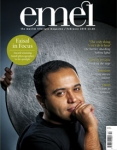
Extending the Hand of Care
Issue 65 February 2010
Sometimes finding the right care for a loved one who is ill can prove impossible for families. Ayman Khwaja meets the founder of The Hyde Park Medical group; an organisation dedicated to providing care solutions when they are most needed.
I still remember vividly the last time I saw my grand- mother. Having vigorously battled cancer for three years, it had finally defeated her, leaving her bedridden and unable to communicate. The morphine had seized all her senses and she spent the last few months of her life in a comatose-like state, opening her eyes occasionally to acknowledge the presence of another in her room.
I walked into her room, ready for my ‘shift’ as it were. Nursing her at home had become impossible and once the doctors informed us she had less than three months to live, we acted on their advice and moved her to a hospice. Still, the thought of strangers taking care of someone you love is one that never quite settles. And yet, we were left with no choice having encountered a string of failed house-carers (both NHS and private) who refused to acknowledge her needs as a human being and treated her merely as a job to be done.
As I settled by her bedside in the hospice, she opened her eyes with difficulty and looked over at me. I smiled lovingly but the blank look in return made me realise that she no longer recognised me. The pain was monu- mental. Worse, still, when the carer on-call for that evening walked in, I saw a glint of acknowledgement in my grandmother’s eyes. “Hello mum,” said the carer and took her arm lovingly to administer the next round of drugs. I left her room that evening completely broken. Two weeks later, she died.
Later, with hindsight, I realised that I let my pride overcome the gratitude and respect I owed to that carer. In the last few months of my grandmother’s life, it was the carer that looked after her with love and careful attention. It was the carer who had gently nursed her in her ill state in the same way that my grandmother had nursed me back to health when I’d fall ill as a child. As hard as it was to deal with the guilt of my feelings of having abandoned her, I became content knowing that someone equally loving but with more experience at dealing with the needs of a cancer patient could attend to her the way she really needed.
It is a natural, human impulse that propels us to believe that no one can take care of the people we love like we ourselves can. Like other communities, family values are of the highest importance amongst Muslims. We are taught to respect and admire our elders from an early age; and the general consensus is that we ourselves will care for our parents, grandparents and relatives in their old age. It says in the Qur’an, “And, out of kindness, lower to your parents the wing of humility, and say: “My Lord! Bestow on them thy Mercy even as they cherished me in childhood.” (17:24) It is this very desire to care for our parents as they once cared for us when we were children that propels us to dismiss external care as an option. Unfortunately, sometimes the burden of caring for the one you love becomes too hard to bear; especially in cases of terminal illness and thus external care is the only option. Choosing the right care option is the issue at hand.
My experiences with my grandmother meant that when I met Mr Nicholas Jaye of The Hyde Park Medical Group I felt a connection to his experience. When his father was diagnosed with dementia, Mr. Jaye recognised that there were no reliable home-care facilities available to those who required constant medical assistance. “We registered with an agency but I was shocked as to how many bad carers we got through. They’d mis- handle him and appeared not to care very much at all. Following that, we admitted him into a nursing home. But their complete disregard meant that my father’s condition deteriorated in a matter of weeks. They had pretty much left him to die. So, we brought him back home and tried to make him as comfortable as possible. Ultimately, watching my father go downhill -a man who was once so respected and admired- was incredibly difficult. I realised during that process that there is a great lack of care options, especially where the elderly are concerned. It was then that I decided things had to change.”
Little over a year after establishing the Hyde Park Medical Group, Mr. Jaye already has over 100 carers on his register. “What we offer is reliable care. If some- one trusts us with their parents or partner, we will look after them better than anyone – as if they were family. This is a fundamental component that is missing in many care agencies – I know because I experienced it firsthand with my father.”
The organisation allocates home carers not only for the elderly and disabled but for those suffering from conditions such as dementia, patients who have under- gone procedures which require rest and recuperation and even those who are pregnant. “The most important thing is making people feel protected,” says Mr. Jaye. “We speak to our clients regularly to make sure our carers are adhering to their requirements.”
The carer’s medical training takes utmost significance when they are assigned to a particular client. Mr. Jaye recalls a particular case in which the carer’s own medical judgment outweighed that of the doctor’s treating his patient. “We had an elderly gentleman who was suffering with Parkinson’s disease. On a Friday evening he experienced terrible pain in his stomach. An ambulance was called, however upon investigation the paramedics said that it was nothing serious. Nonetheless, the pain continued over the next couple of hours. The elderly man’s carer, who was familiar with the gentleman’s medical history, recognised the symptoms of a twisted bowl and took the man to hospital. Upon undergoing an x-ray, the doctors diagnosed him with a twisted bowl and decided to operate but the care worker re-examined the x-ray and realised that his patient had been in the wrong position prior to the x- ray being conducted. He demanded a second one and his suspicions were confirmed. The surgery that was about to commence would have in all likelihood killed the gentleman because he had severe Parkinson’s. The care worker essentially saved his patient’s life.”
“Matching clients with carers is a calculated and thorough process,” affirms Mr. Jaye. Carers are not only matched upon their medical experience but also their characteristics; ensuring that the carers and cli- ents have similar hobbies, interests and to some extent, even lifestyles. “We arrange it so that the client feels completely comfortable. This can mean finding a carer that is the same nationality as them or one who can speak their native language. For example, we had a cli- ent who had broken her arm. As an elderly Muslim woman with little family around her, she not only required a female carer but one who understood her lifestyle. This meant briefing the carer to make simple adjustments like scheduling domestic tasks like shop- ping around her prayer times and teaching her easier ways to perform ablution during the rehabilitation process. It’s vital that the carer understands his or her patient. That is the only way that they can provide the best care,” remarks Mr. Jaye.
Still a relatively small organisation, Mr. Jaye has big plans to ensure his vision is shared with the rest of the world. “The UK is groundbreaking generally speak- ing in advances and technology. The NHS tries to save your life, but they’re just not so focused on the quality, unless you’re very lucky. But our private medical care is some of the best in the world. My goal is to now make sure it’s also available to everyone.” Determined to create a ‘one-stop’ medical package, which allows patients everything from home-carers to medical supplies being delivered directly to their door, Mr. Jaye appears committed to establishing clinics in more under-developed areas of the world to ensure that the best care is avail- able globally.
The Qur’an reminds us “that every soul must taste of death”. With this truth self evident, it is certainly the wish of all of us that the end may come peacefully. Yet for those who have nursed a terminally ill relative, we know that such a wish is not the destiny of all. Knowing that the prophet said, “Nothing strikes a Muslim – no fatigue, illness, worry, grief, hurt nor sorrow; not even a prick of a thorn– except that God wipes off some of his sins” brings healing to the heart of anyone who has witnessed illness ravaging the once strong body of a loved one. Finding trained and loving care providers also helps heal the heart.
Bookmark this |
|
Add to DIGG |
|
Add to del.icio.us |
|
Stumble this |
|
Share on Facebook |
|
Share this |
|
Send to a Friend |
|
Link to this |
|
Printer Friendly |
|
Print in plain text |
|


Comments
0 Comments